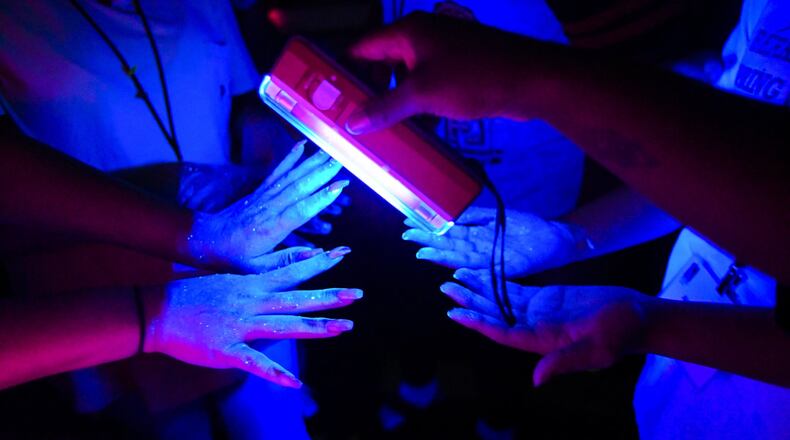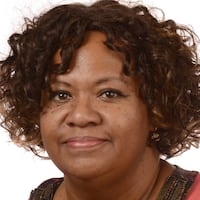Many of the students, studying bacteria people touch every day, thought the dirtiest thing they could find would be a toilet seat or the bottom of their shoes. They were surprised to discover it’s their cellphone.
“Why do you think that is?” asked Valerie Cadet, assistant professor of pathology, microbiology, immunology and forensic medicine.
Several hands shot up. “Because you’re touching it all the time and your hands come in contact with a lot of surfaces and can transfer bacteria,” answered one student, beaming.
Related story: Gwinnett math teachers get hands-on training
Related story: Gwinnett schools launch summer book mobiles
Related story: Students go on dream trip to Belize to study coral
They were among 21 students from Berkmar and Meadowcreek high schools in a two-week summer camp offered by Philadelphia College of Osteopathic Medicine.
It’s intended to expose Gwinnett students interested in medical careers to areas they may not have considered. With hundreds of jobs from administrators, to surgeons, nurses and lab techs and many more, choosing a field of study can be difficult.
To most Americans, physicians are medical doctors, also known as allopaths. They use treatments for illnesses that are different than what they’d give someone who is healthy, according to Dr. Murtaza Ahmed, a critical care physician and blogger for myheart.net. For example, he wrote, a medical doctor would prescribe antibiotics for someone who is ill, but not for a healthy person. With a different school of thought, according to Ahmed, doctors of osteopathic medicine are trained to have a more holistic approach to medicine. DOs are trained to consider a patient’s environment, nutrition and body system as a whole when diagnosing and treating medical conditions.
Cadet’s students had taken swabs of various surfaces the day before and were studying the bacteria cultures growing in petri dishes.
In another experiment, the instructor put powder on the students’ hands and told them to go wash them — careful not to touch doors or faucets in the process.
They then put their hands under black lights to see how much of the residue remained.
“Oh my God!” exclaimed one student. “It doesn’t look like I washed my hands at all!”
Cadet explained why hand-washing is so important. “Your hands touch so many things and when you touch your eyes or nose or put something in your mouth, you transfer germs and bacteria through mucous membranes,” she said.
Berkmar rising senior Alina Escobar found the experience fascinating. She had thoughts of a nursing career after high school and the summer camp opened her eyes to other options.
Her soon-to-be stepmom is a nurse practitioner, and Alina admires the drive and focus needed to be successful in medicine.
“After my mom passed away I didn’t really push myself to further my education,” she said. But people around her motivated her to try for things — like applying for the PCOM summer camp.
“At first I didn’t think they’d pick me and then I thought, ‘why not me?’ ” she said.
PCOM students helped structure the camp to make it resonate with the high schoolers.
Alexis Gaylord majored in biology at Fort Valley State and came to PCOM to be closer to home. The Colins High graduate is expected to get her doctorate in pharmacology in 2021.
“This way I can live at home and save a little money while I’m in school,” she said.
Appealing to students in the area is a big draw for PCOM. It’s partnered with Gwinnett County Public Schools (which is headquartered a block or two down the road) for several projects including judging science fairs and offering students lab space for different programs.
“We’re always looking at ways to work with the community,” said Aisha DeBerry, PCOM director of diversity and community partnerships. “This is one of the most gratifying.”
What is osteopathic medicine?
Osteopathic physicians, also known as DOs, work in partnership with their patients. They consider the impact that lifestyle and community have on the health of each individual, and they work to break down barriers to good health. DOs are licensed to practice the full scope of medicine in all 50 states. They practice in all types of environments, including the military, and in all types of specialties, from family medicine to obstetrics, surgery and aerospace medicine.
Five facts about osteopathic medicine
- In the United States, doctors are either an MD (allopathic) or DO (osteopathic), but both are similar in that the treat patients, prescribe drugs, perform surgeries, etc.
- More than 6,500 new osteopathic physicians enter the workforce each year.
- There are approximately 114,000 fully-licensed osteopathic physicians in the United States.
- Today, more than 25 percent of medical students in the United States are training to be osteopathic physicians.
- MDs and DOs make similar salaries, but MDs tend to practice in larger, urban areas with a higher cost of living.
Source: American Association of Colleges of Osteopathic Medicine, Bureau of Labor Statistics
About the Author
Keep Reading
The Latest
Featured


